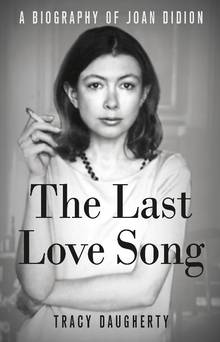September 1, 2015
The Last Love Song
 I’ve been reading The Last Love Song: A Biography of Joan Didion for nearly a week, a grand hulking book at 500+ pages. I spent Sunday afternoon in my hammock with it, and when I was finished, I’d never felt so languid. I do one day want to write an essay about Joan Didion, Mad Men, and longing. So I am inspired, even though The Last Love Song is not a particularly good biography—most of its source material is Didion’s autobiographical nonfiction, which I’ve read so many times that I know whole sentences by heart. So it’s not really illuminating. And Didion herself has made a career of being elusive, self-effacing. Also, if Didion’s brother-in-law Dominick Dunne had not been such a shameless name-dropper with a really big mouth, the author wouldn’t have much to go on. But it’s still interesting, because Didion herself is so compelling. The best parts of the book are when author Tracy Daugherty shows us how her writing works and why, dissecting her distinctive sentences. With Didion, it’s so easy to gloss over her polished surfaces and take everything at face-value that I hadn’t always read so closely. The worst parts of the book (not including the faux-Didion cadences and use of repetition and patterns) are when he tries to find autobiography in her writing itself, in which she’d always positioned herself so carefully. The mother-blaming for her daughter’s troubles is subtle but persistent, and troubling. There is nuance is Blue Nights that readers didn’t get, and I don’t think Daugherty gets it either. That Joan Didion couldn’t ever have been a mother except the mother she was. To suppose there is any other option is beside the point and not that interesting. But still, with its flaws, The Last Love Song is worthwhile and it’s good and heartening to see a female writer feted this way. Read Didion first though
I’ve been reading The Last Love Song: A Biography of Joan Didion for nearly a week, a grand hulking book at 500+ pages. I spent Sunday afternoon in my hammock with it, and when I was finished, I’d never felt so languid. I do one day want to write an essay about Joan Didion, Mad Men, and longing. So I am inspired, even though The Last Love Song is not a particularly good biography—most of its source material is Didion’s autobiographical nonfiction, which I’ve read so many times that I know whole sentences by heart. So it’s not really illuminating. And Didion herself has made a career of being elusive, self-effacing. Also, if Didion’s brother-in-law Dominick Dunne had not been such a shameless name-dropper with a really big mouth, the author wouldn’t have much to go on. But it’s still interesting, because Didion herself is so compelling. The best parts of the book are when author Tracy Daugherty shows us how her writing works and why, dissecting her distinctive sentences. With Didion, it’s so easy to gloss over her polished surfaces and take everything at face-value that I hadn’t always read so closely. The worst parts of the book (not including the faux-Didion cadences and use of repetition and patterns) are when he tries to find autobiography in her writing itself, in which she’d always positioned herself so carefully. The mother-blaming for her daughter’s troubles is subtle but persistent, and troubling. There is nuance is Blue Nights that readers didn’t get, and I don’t think Daugherty gets it either. That Joan Didion couldn’t ever have been a mother except the mother she was. To suppose there is any other option is beside the point and not that interesting. But still, with its flaws, The Last Love Song is worthwhile and it’s good and heartening to see a female writer feted this way. Read Didion first though





